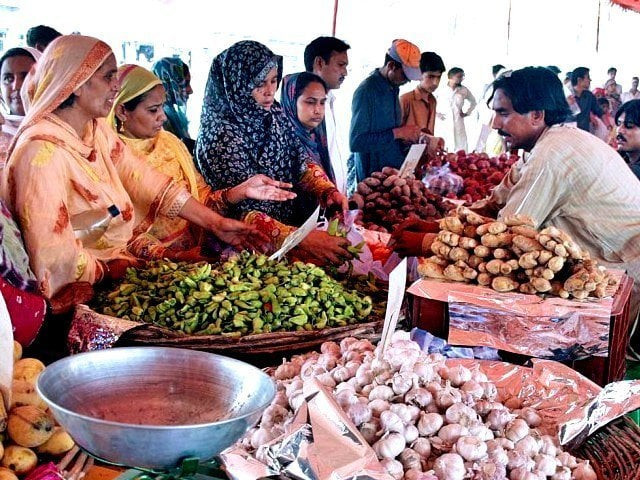Inflation casts shadow over Ramazan festivities
Prices of essential kitchen staples skyrocketed by over 200% on the first day of Ramazan

As Pakistan welcomes the sacred month of Ramazan, households find themselves grappling with a staggering increase in food prices, delivering a harsh blow to their wallets and plunging them into hardship.
On the first day of Ramazan, the prices of essential kitchen staples skyrocketed by over 200%, sending shockwaves through consumers. Capsicum, commonly known as "shimla mirch," shot up to over Rs600/kg in retail markets in Karachi, a drastic jump from its previous price of less than Rs200/kg.
Despite the federal government temporarily halting the export of onions and bananas in an attempt to decelerate and stabilise their prices in the country, the cost of these items continued to climb in domestic markets.
On Tuesday, onion prices surged by up to 100%, reaching Rs250-300/kg, while bananas witnessed a similar surge, reaching Rs200/dozen or more, up from Rs100-150/dozen just a week earlier.
Bananas (average quality) became costlier to Rs200/dozen or more from Rs100-150/dozen about a week ago.
The veal's (meat of young cow) prices up Rs200-300/kg to Rs1,400-1,500/kg on the first day of the holy month of Ramazan from around Rs1,100-1,200/kg.
Prices of other foods surged significantly including melon, watermelon, apple, cabbage, carrot, potato, tomatoes, gram flour, brown chickpea, white chickpea and mutton.
While talking to The Express Tribune, All Pakistan Fruit and Vegetable Exporters, Importers and Merchants Association (PFVA), Patron-in-Chief, Waheed Ahmed said the markets may observe ease in onion prices over the next couple of days, as traders were still purchasing onion for exports till yesterday (Monday) in Karachi' wholesale market located on super highway.
The Federal Ministry of Commerce issued the notice on Tuesday, temporarily suspending the export of onion and bananas with immediate effect till April 15, 2024.
Read: PM directs uninterrupted gas, power supply in Ramazan
He, however, claimed onions would see a notable price drop from the next month when the new crop of the commodity would start arriving at domestic markets from Balochistan in April.
He believed that the temporary ban placed on the export of bananas may fail to make any difference in its price, going forward, as a very small quantity of the fruit was being exported to merely Afghanistan and Iran.
The phenomenon of price hikes was largely associated with the short production of the commodity compared to its prevailing demand inside the country.
When confronted with inquiries about the widespread price hikes, Ahmed pointed out that the surge wasn't confined to just the two export items. He noted that for the past 10 to 12 years, he had observed a trend where food prices skyrocketed in the initial week of Ramazan, only to gradually taper off after the first 5 to 6 days of the holy month.
He projected the same trend may prevail this Ramazan as well, estimating the price-hike would reverse to normal levels from next week.
Ahmed emphasised the critical need to investigate why Pakistan transitioned from being a net exporter to a net importer of food items some years ago, exacerbating food insecurity within the country.
The export ban is no solution, but giving birth to problems like rising unemployment in the agriculture sector and in associated supply chain management and reducing the inflow of foreign exchange reserves.
He claimed not a single government has given the required priority and focus to agriculture over the past 30 years. This has resulted in reducing production instead of increasing along with the rising population.
He said climate change is the basic cause of low production of foods in the country. There is a great need to do research and development (R&D) in the agriculture sector to establish climate-friendly and climate-resilient seeds, take surplus production and export them.
This would help create new employment opportunities and earn more foreign exchange reserves.



















COMMENTS
Comments are moderated and generally will be posted if they are on-topic and not abusive.
For more information, please see our Comments FAQ